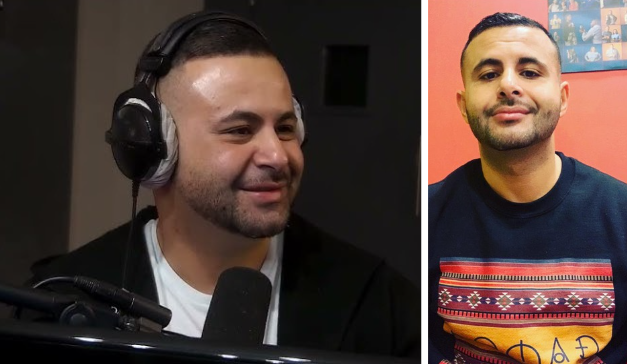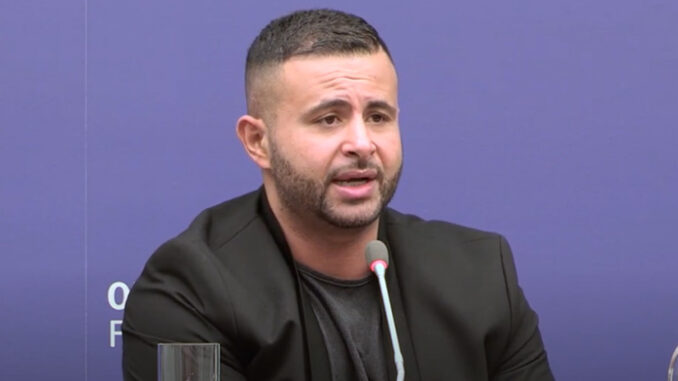Celebrity
The Influence of Khaled A. Beydoun in American Higher Education

Khaled A. Beydoun is an influential figure in American higher education, known for his groundbreaking work in law, civil rights, and his academic contributions. His career has deeply impacted the landscape of higher education and social justice. This article explores his biography, achievements, teaching philosophy, and his broader influence on academia and the public.
Quick Bio
| Full Name | Khaled Abou El Fadl Beydoun |
|---|---|
| Date of Birth | June 7, 1982 |
| Nationality | American |
| Education | JD, University of California, Berkeley |
| Current Position | Associate Professor of Law, University of Detroit Mercy |
| Fields of Expertise | Law, Civil Rights, Social Justice, Higher Education |
| Publications | Author of numerous articles on race, law, and civil rights |
| Notable Works | “American Islamophobia: Understanding the Roots and Rise of Fear” |
| Academic Contributions | Published in leading legal and social justice journals |
| Social Media | Twitter: @KhaledBeydoun |
| Awards & Honors | Recognized as a prominent voice in the fight for racial justice and equality |
Khaled A. Beydoun’s Early Life and Educational Journey
Born in 1982, Khaled A. Beydoun grew up with an awareness of global issues that would shape his academic pursuits. Raised in a family that valued education, he became passionate about the intersection of law, human rights, and social justice early on. His academic path began with a strong foundation in political science, which later transitioned into law as he sought to understand how systems of power affect marginalized communities.
After completing his undergraduate studies, Beydoun attended the University of California, Berkeley, where he earned his Juris Doctor (JD). This educational milestone positioned him as a scholar who was deeply engaged in both legal theory and practical solutions to societal injustices. His work in law has always been coupled with a strong commitment to addressing systemic discrimination, particularly focusing on race, Islamophobia, and civil rights.
Khaled A. Beydoun’s Teaching Career

Khaled A. Beydoun is currently an Associate Professor of Law at the University of Detroit Mercy, where he educates the next generation of legal professionals. His approach to teaching is rooted in a deep understanding of the law’s role in shaping society. By focusing on the intersections between race, religion, and legal structures, Beydoun encourages students to consider how legal frameworks can either perpetuate or challenge injustices. His classes often delve into complex issues such as Islamophobia, racial profiling, and the challenges faced by marginalized communities in legal systems.
His teaching style combines rigorous academic analysis with a practical approach to understanding how law operates in the real world. He inspires students to think critically about the legal profession and its broader implications on society. Beydoun’s dedication to teaching and mentoring future legal minds has earned him a reputation as one of the most influential educators in his field.
Khaled A. Beydoun’s Scholarly Contributions
As a prolific scholar, Beydoun has written extensively about the intersections of race, law, and Islamophobia. His work has been featured in leading law journals and academic publications, where he explores how the legal system impacts both American Muslims and other marginalized groups. His book, American Islamophobia: Understanding the Roots and Rise of Fear, explores the systemic discrimination against Muslims in the United States, particularly post-9/11.
Through his scholarly writings, Beydoun provides insight into the ways that law and policy contribute to racial and religious discrimination. His work is pivotal in understanding the historical and contemporary challenges faced by Muslim Americans, as well as the broader issues of racial justice and equity.
The Impact of Khaled A. Beydoun on Social Justice Movements

Khaled A. Beydoun is also known for his active involvement in social justice movements. His scholarship and activism are deeply interconnected, with a focus on raising awareness of issues such as Islamophobia, racial profiling, and civil rights violations. Beydoun has used his platform to engage in public discussions about the rights of marginalized communities and has become a trusted voice in the fight for racial and religious equality.
His work has had a lasting impact on the way scholars, activists, and policymakers address the challenges facing Muslim Americans and other minority groups. By linking academic research to activism, Beydoun has helped bridge the gap between theory and practice in the pursuit of justice.
Khaled A. Beydoun’s Contributions to Public Discourse
Beydoun is not only an academic but also an active participant in public discourse. He frequently contributes to national and international conversations on law, race, and religion. His writings have appeared in major publications such as The New York Times, The Washington Post, and Al Jazeera, where he offers insights into the ongoing issues of racial and religious discrimination in the United States.
His ability to engage with the public has broadened the reach of his work, allowing him to influence a wider audience beyond academia. Through his articles, interviews, and public speaking engagements, Beydoun has become a key figure in conversations about civil rights, Islamophobia, and the legal system’s role in perpetuating injustice.
Khaled A. Beydoun and the Growth of Academic Thought
Beydoun’s academic contributions have helped shape the field of legal studies, particularly in the areas of race and religion. His research has contributed to a deeper understanding of how law intersects with societal issues such as discrimination, identity, and power dynamics. By examining the legal framework surrounding the treatment of Muslims in the United States, Beydoun has provided scholars with new insights and perspectives that challenge traditional understandings of race and religion in law.
Through his rigorous research, Beydoun has introduced fresh methodologies for analyzing legal texts and practices. His work has encouraged a new generation of scholars to explore the intersections of law, race, and religion, contributing to a more inclusive and equitable academic environment.
Khaled A. Beydoun’s Influence Beyond Academia
While Beydoun’s primary role is within academia, his influence extends far beyond the classroom and research journal articles. He is frequently invited to speak at conferences, universities, and policy forums, where his expertise on issues related to Islamophobia, racial justice, and civil rights is sought after. His public lectures and panel discussions have educated countless individuals and groups about the need for systemic change in how the law interacts with marginalized communities.
Additionally, Beydoun’s ability to communicate complex academic ideas to the general public has made him a vital resource for those seeking to understand the social and political dynamics affecting Muslim communities and racial minorities in the United States. His influence has fostered a broader awareness of the structural injustices that affect these communities.
Khaled A. Beydoun’s Role in Shaping Public Policy
As an advocate for justice and equality, Beydoun’s work has contributed to shaping public policy discussions on civil rights, particularly in relation to Muslim Americans. He has been a vocal critic of policies that discriminate against Muslims, including the so-called “Muslim Ban,” and has advocated for more inclusive policies that protect the rights of minority communities. His research and activism have provided policymakers with the necessary tools to understand the impact of discriminatory policies and to formulate more just and equitable alternatives.
Through his public policy work, Beydoun has demonstrated the critical role that academics can play in shaping national conversations and influencing the decisions made by lawmakers. His work continues to inspire activists, scholars, and policymakers to work toward a more inclusive and just society.
Khaled A. Beydoun’s Vision for the Future of American Higher Education
Looking ahead, Beydoun envisions an American higher education system that is more inclusive, diverse, and responsive to the needs of marginalized communities. He believes that institutions of higher learning should be places where students are encouraged to critically engage with issues of social justice and inequality, and that educators should model the values of empathy, equity, and integrity.
Beydoun’s own work exemplifies these values, and he advocates for a curriculum that better reflects the diversity of experiences and perspectives that exist in the world. By promoting these ideals, Beydoun hopes to help shape a future where American higher education can contribute more effectively to addressing the social challenges facing the country.
Khaled A. Beydoun’s Legacy in Academia and Beyond
As a leading academic figure in the fields of law and civil rights, Khaled A. Beydoun’s legacy will undoubtedly continue to influence both academic discourse and real-world activism. His commitment to justice, equality, and social change has left an indelible mark on American higher education, and his work will serve as a touchstone for future scholars and activists working toward a more just society.
Beydoun’s academic achievements, combined with his advocacy for marginalized communities, position him as one of the leading voices in the ongoing fight for racial and religious justice. His contributions have helped to shape the way scholars and activists approach issues of discrimination, and his work will continue to inspire future generations.
Conclusion
Khaled A. Beydoun’s contributions to American higher education extend far beyond his role as a professor. Through his scholarship, activism, and public discourse, Beydoun has become a key figure in the fight for racial and religious justice. His work has reshaped how we understand the intersections of law, race, and religion, and his influence continues to inspire change in both academia and society at large.
FAQs
What is Khaled A. Beydoun known for?
Khaled A. Beydoun is known for his work on race, Islamophobia, civil rights, and his role in shaping public policy and higher education.
Where does Khaled A. Beydoun currently teach?
He is an Associate Professor of Law at the University of Detroit Mercy.
What are Khaled A. Beydoun’s most significant contributions?
Beydoun’s significant contributions include his book American Islamophobia and his advocacy for racial justice, civil rights, and Islamophobia awareness.
How has Khaled A. Beydoun influenced higher education?
Beydoun has influenced higher education by integrating social justice issues into legal studies, encouraging a critical approach to race and law in academia.
What is the focus of Khaled A. Beydoun’s scholarship?
His scholarship focuses on the intersection of race, religion, law, and social justice, particularly examining Islamophobia and racial discrimination in the U.S.
More Info And Buzz Visit: Dodge Buzz
-

 Celebrity10 months ago
Celebrity10 months agoWho Is Steve Cena? All About John Cena’s Brother and His Life
-

 Celebrity11 months ago
Celebrity11 months agoWho is Nadia Farmiga? All You Need to Know About Vera Farmiga’s Sister
-

 Uncategorized11 months ago
Uncategorized11 months agoWho is Janet Gayle? All About Gary Burghoff’s Ex-Wife
-

 Celebrity11 months ago
Celebrity11 months agoWho Is Samuel Nowlin Reeves Jr.? The Untold Biography of Keanu Reeves’ Father




















